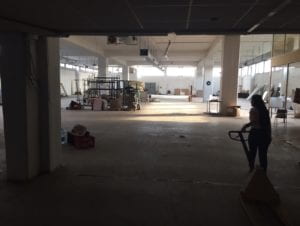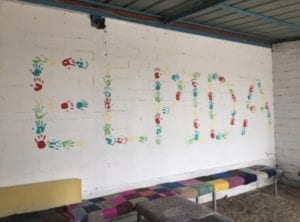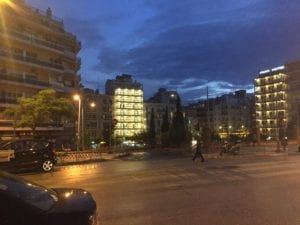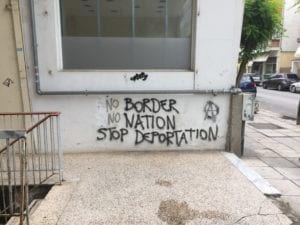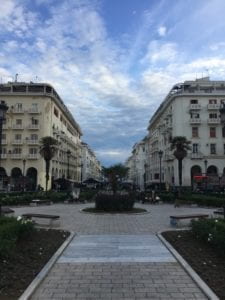Michael Leonetti
Zaatar
Athens, Greece
Hello! In this blog post, I will detail the circumstances that led to the closing of the Elpida Home for Refugees in Thessaloniki and introduce the NGO that I have been volunteering/interning with for the past few weeks.
First, a disclaimer: the Greek government is tight-lipped about its refugee-related policies and as such it is impossible to isolate a 100% verifiable reason for the closing of refugee camps in the north of the country. Below are some theories that have been floated in Greek government statements, news publications, and in volunteer circles.
The government is beginning an effort to move documented asylum seekers (i.e., those with refugee status, and to a lesser extent, those registered in the asylum process) into private residences such as apartments or government-controlled housing units. Those who lack documentation or who are in the earlier stages of the asylum process will remain in large refugee camps. In Thessaloniki, the government is shrinking the number down to two (Lagadikia and Diavatar) in order to centralize the refugee housing project.
This plan seems to be (primarily) financially motivated. It is no secret that the inefficiency of the Greek response to the refugee crisis has long frustrated officials at the European Civil Protection and Humanitarian Aid Operations (ECHO), who bankroll much of said response. Adding to the stress between ECHO and the government is the fact that NGO operations remain better-funded and more ubiquitous than those of the government, which has decentralized the response around the country. For a comprehensive look into how the Greek response became the latest example of humanitarian waste, check out this article from News Deeply.
As an attempted course-correction, ECHO will redirect funds that were going to NGOs directly to the government, starting August 1st. This redirection comes with some strings attached; many believe that the new plan to house refugees in apartments and centralize the camps is a condition of ECHO’s new cash flow to the government. A Medium article about the closing of the Elpida Home contains this view.
This is the most plausible explanation for the closing of Elpida and the imminent closing of many operations like it. We were an autonomous privately funded residential project filled with documented asylum seekers, exactly the kind of site that the government has set its targets on. At the end of June, all of the Elpida residents were moved into apartments around Thessaloniki. They will remain there while awaiting resettlement or family reunification. It remains to be seen whether the government can adequately provide services such as medical care and legal aid. At Elpida, we had all of these services and more on site. Providing them to families living around the city will be more complicated.
After we shut the doors in Thessaloniki, I began to look for a similar initiative in other cities around the country. After a week of searching, I ended up moving to Athens to work with Zaatar, an organization with a number of projects in the city. Currently, I hold a volunteer position and an internship.
As a volunteer, I assist with the day-to-day operations of the Orange House, a small residence and community center. The upper level of the OH contains a series of private housing units that shelters a total capacity of twenty-five women and children. The residence is overseen by a long-time resident and asylum seeker. In her role as head resident, she assists in the interview process during the potential intake of a new occupant, making the OH almost exclusively resident-run. Volunteers and visitors are forbidden from entering the residence except in emergency situations. Since we are located in an anarchist neighborhood with no police presence, government authorities rarely (if ever) enter the OH.
As an intern, I have been working with ATLAS (Aid to LGBTQ Asylum Seekers), a new Zaatar project geared specifically towards addressing the needs of LGBTQI+ refugees and asylum seekers. We are primarily a referral service: every day, we are contacted by persons from around Greece (in addition to Turkey, Egypt, Nigeria, and a dozen other countries) looking for LGBTQI+-friendly legal services, shelter, medical care, and other services. We are also working to make partnerships with NGOs, embassies, government agencies, camps, and other actors around Greece to ensure that these especially vulnerable asylum seekers can get all the necessary information and help they need.
If you are interested in current refugee-related events in and around Greece, the Are You Syrious Facebook page is a great way to stay informed. Thank you for reading this post!

